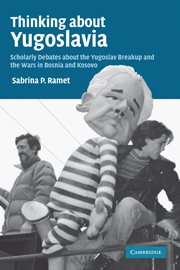 Thinking about Yugoslavia
Thinking about Yugoslavia Book contents
- Frontmatter
- Contents
- Preface
- List of books discussed
- Glossary
- 1 Debates about the war
- 2 The collapse of East European communism
- 3 The roots of the Yugoslav collapse
- 4 Who's to blame, and for what? Rival accounts of the war
- 5 Memoirs and autobiographies
- 6 The scourge of nationalism and the quest for harmony
- 7 Milošević's place in history
- 8 Dilemmas in post-Dayton Bosnia
- 9 Crisis in Kosovo/a (with Angelo Georgakis)
- 10 Debates about intervention
- 11 Lands and peoples: Bosnia, Croatia, Slovenia, Serbia
- 12 Southern republics: Macedonia and Montenegro in contemporary history
- 13 Conclusion: controversies, methodological disputes, and suggested reading
- Index
- References
3 - The roots of the Yugoslav collapse
Published online by Cambridge University Press: 22 September 2009
- Frontmatter
- Contents
- Preface
- List of books discussed
- Glossary
- 1 Debates about the war
- 2 The collapse of East European communism
- 3 The roots of the Yugoslav collapse
- 4 Who's to blame, and for what? Rival accounts of the war
- 5 Memoirs and autobiographies
- 6 The scourge of nationalism and the quest for harmony
- 7 Milošević's place in history
- 8 Dilemmas in post-Dayton Bosnia
- 9 Crisis in Kosovo/a (with Angelo Georgakis)
- 10 Debates about intervention
- 11 Lands and peoples: Bosnia, Croatia, Slovenia, Serbia
- 12 Southern republics: Macedonia and Montenegro in contemporary history
- 13 Conclusion: controversies, methodological disputes, and suggested reading
- Index
- References
Summary
The split between idealists and realists is, of course, not the only debate to have divided the field of Yugoslav studies. For as long as I have been observing Yugoslavia, I have been struck by the ongoing (and unending) debate between scholars who have wanted to have faith in any formula or arrangement that might be presented as potentially stabilizing and favourable, and scholars who have lived in expectation that catastrophe was around the corner. This temperamental difference between optimists and pessimists was reflected in differing views of self-management, the 1974 constitution, post-Titoist policy in Kosovo, the prospects for communism in Eastern Europe as a whole, the dangers (or, for optimists, ‘alleged dangers’) of civil war in Yugoslavia, the prospects for the establishment of the rule of law in post-communist Eastern Europe, and the prospects for a negotiated peace in ex-Yugoslavia. In the early 1990s, one of the manifestations of this debate was that optimists took to blaming the Yugoslav civil war on Western manipulation (which was, in fact, the Serbian propaganda line), on the assumption that, left to themselves, the Yugoslavs would never have gone to war, while pessimists found sufficient roots of the conflict internally.
To some extent, the difference between optimists and pessimists was sustained by differences in their very research methodologies. Optimists – who were sometimes ‘cynical optimists’, optimistic about system survival and institutional stability, but disinterested in human rights struggles locally – tended to focus their attention on official publications and to devote their interview energy to talking with officials.
- Type
- Chapter
- Information
- Thinking about YugoslaviaScholarly Debates about the Yugoslav Breakup and the Wars in Bosnia and Kosovo, pp. 54 - 75Publisher: Cambridge University PressPrint publication year: 2005


